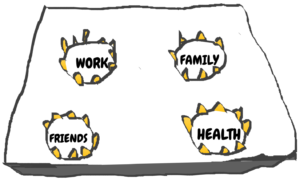My dear Sir, I look at you askance
You suffer from cognitive dissonance
How can you pity the starving poor
When you waste your food all o’er
And blame it all on happenstance?
We observed Cognitive Dissonance when we once pitched for a Workshop Series with a Key Account. We had done several similar assignments for this company and we had communicated this to them quite clearly as there was a new bunch of decision-makers now. We trusted that this history and experience of our work with them in the past would give us a clear edge over the competition.
We finally met with the Sales head who was the Decision Maker, and while creating a connect with her and breaking the ice, we talked of her prior experience and how it was so different from the industry she was now in. She had recently joined this company, having worked in other industries in the past. The Sales head enthusiastically asserted that sales experience and learnings can be applied to any industry, and she did not see this as an impediment to her success in this new leadership role. We agreed and then went on to make our presentation pitch. Somewhere in the middle of the pitch, she came up with the objection that though we had done several assignments with their company in the past, we had not specifically covered the topic that they were seeking in this project. We lost the pitch subsequently, and I was left scratching my head in bewilderment… I mean, we had all the credentials and the experience with fantastic reviews of our work done in the past with this company. Yet, the Sales head felt we did not have the necessary experience to handle their current need… strange, when she herself (having had no experience in this industry), had been given charge of her sales domain in this company; and had claimed earlier to us that the Sales domain was a common domain regardless of industry!
Cognitive dissonance is a mental conflict that occurs when your beliefs don’t line up with your actions. It’s an uncomfortable state of mind when an individual has contradictory values, attitudes, or perspectives about the same thing.
I could recount countless such examples, and I am sure you, as the reader, will recollect such situations of ‘cognitive dissonance’ (aka Cog Diss) occurring around you.
- When a key decision maker of a company, booking a banquet function, brags of having done similar functions in the past at premium hotels in India and abroad, and then goes on to ask for an abysmally low rate (as ludicrous as expecting a Mercedes for the price of a Santro), bang! That’s Cog Diss.
- Or, what about an ostentatious parent booking his daughter’s wedding function, flying in people from all over the world, and he is the MD of a Fortune 500 company touting its ESG values… bang! Cog Diss.
- And then you have a government having the capability to produce a vaccine to control a pandemic, yet asking the populace to bring out their thalis et al to create an obnoxious din, loud enough to supposedly scare the virus away (but which barely scares the crows away), bang! That’s Cog Diss again.
- In British India, when the xenophobic Britishers disallowed Indians from joining or entering establishments, they forgot that these same Indians, earlier, had access to more magnificent edifices and establishments in the past, bang… Cog Diss!
- Many organisations claim their employees to be their biggest assets, and also include this in their mission statement, yet when calamity, ego, or circumstance strikes, the employees are the first to be let go, quite ruthlessly… remember Kingfisher airways and the Promoter? Bang, that’s Cog Diss!
Leon Festinger’s theory of Cognitive Dissonance (1957) proposes that inconsistency among beliefs or behaviours causes an uncomfortable psychological tension, leading people to change one of the inconsistent elements to reduce the dissonance or to add consonant elements to restore consonance. What it means is that when we believe and act oppositely, we are suffering from Cog Diss. To be in consonance, we either need to change our beliefs or else change our actions, each to match the other, and thus be apposite to each other.
Hence, when we use plastic bags despite knowing that we are treading shamelessly on Cog Diss since we are hurting the environment; what we need to do is either change the action (stop using plastic) or else change our belief that plastic is harmful to the environment. Since the latter is a lie, and untrue, the choice of modelling our action to the belief is obvious, and we need to stop using plastic. That feeling of mental discomfort when using plastic bags is an example of cognitive dissonance. This is because our beliefs are clashing with our actions or behaviour. We believe that humans need to protect the environment, yet we still use plastic bags. The internal conflict that this causes, keeps us in turmoil.
I have seen a few leaders with commendable values, who say and act what they think and feel, in all sincerity… these are the highly respected ones. Cog Diss rarely appears on their horizon, and they are considered stable, level-headed, and looked upon as true role models. Mahatma Gandhi is one of the greatest examples of this consonance between thought and behaviour.
So, what stops us leaders from ducking away from Cognitive Dissonance and embracing Cognitive Consonance?









